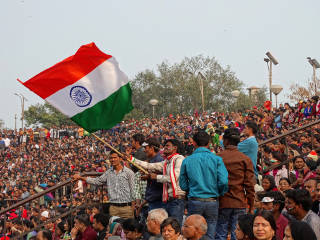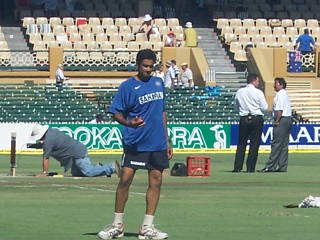[By Blogtrepreneur under Creative Commons]
Dear Friend,
The evening of 5th September brought terrible news. Gauri Lankesh, a 55-year-old journalist and editor of a Kannada weekly tabloid Gauri Lankesh Patrike, was shot dead just outside her house.
It shocked everyone who knew her, personally or through her writing and activism. Even those who came to know of her for the first time seemed to instinctively grasp one thing: she was killed for her views.
That’s the most cruel way to say, “I don’t want to listen to you.”
Unwillingness to listen to people who are not like us or people whom we don’t like—for political, personal or moral reasons—is common. The traditional approach to deal with such situations is to say, “Let it be. You go your way, and I will go my way.”
However, as the world gets more interconnected (and polarised—both at the same time), this may not be an optimal solution. After all, we share the same planet; the future we build today, is the future our children and grandchildren will occupy. Those of us who want to solve the problems facing the world today, and build a better future, have to figure out a way to work with people who are ‘not like us’.
In his book, Listening for Well-Being: Conversations with People Not Like Us, Arun Maira offers ideas for how that can happen (Founding Fuel carried an extract from his book recently: How do you create space for multiple perspectives...). It’s not just a theory. Maira offers several examples of how it works in practice. And we only have to look around us to see that it’s also happening even in these polarised times. On Saturday, in Bengaluru, Karnataka Chief Minister Siddaramaiah, an avowed atheist, shared stage with Sadhguru Jaggi Vasudev of Isha Foundation for an initiative to raise awareness about India’s degrading rivers and to work towards a solution. If we want to solve problems—and India, and the world indeed, have many crying to be solved—we have to work with people who might be our ideological opponents. And to do that, the first step is to listen.
In the early days of the internet, many of us naively believed that “the new new thing”, by itself, will make the world more egalitarian, democratic and open. It didn’t turn out that way. That’s one of the points Charles Assisi makes in his piece, Enjoy the data while it lasts... Instead of making the world more open to new ideas, the internet is pushing us into filter bubbles. We listen, but we listen only to people like us.
Steve Jobs once described a computer as ‘a bicycle for the mind’. It’s a fascinating and insightful observation about the nature of technology. A bicycle can make us go faster. The problem is, if we are going in the wrong direction, and towards a harmful destination, we will reach there faster. A bicycle by itself cannot tell us if we are going in the right direction. We have to consult a map, we have to look around, we have to ask people for directions. We have to listen to people who are ‘not like us’.
In his introduction to Maira’s book, the Dalai Lama writes, “Listening is the first of the three wisdom tools in Buddhist tradition, the other two being contemplating and meditating; it is the gateway to improving oneself, both mentally and physically. Listening, without preconceived notion and with respect and full attention, is the way to understand each other. This is the real way to communicate on issues without any distortion.”
In much the same way, one of our hopes for the Founding Fuel Slack community is to build it into a platform where people from diverse backgrounds, and with an exposure to a wider world than what the internet usually represents, can get together, share and listen to each other. To make that happen we need both your participation and your guidance.
If you received this newsletter as a forward, I invite you to subscribe to it.
Regards,
NS Ramnath
On behalf of Team Founding Fuel
Featured Stories
Enjoy the data while it lasts. It won’t for too long

[By Gerd Altmann (CC0 1.0), Via Pixabay]
Behind your back, a fierce battle is being fought between actors of all kinds over who owns you. It will end soon. But a price will have to be paid. That includes our privacy (By Charles Assisi. Read Time: 11 mins)
The Aadhaar Briefing Note #1

[By ar130405 (CC0 1.0), via Pixabay]
Our inaugural edition explores these: What’s next for Aadhaar after the Supreme Court’s privacy verdict? Should we worry about the security of the Aadhaar ecosystem, even if we are confident about the security of its core database? Is Facebook becoming a data monopoly? And a digest of recent news on Aadhaar. (By NS Ramnath. Read Time: 4 mins)
What We Are Reading
‘My friend and first love, Gauri Lankesh was the epitome of amazing grace’
Ex-husband’s tribute. (By Chidanand Rajghatta)
The ‘why’ behind asking why: The science of curiosity
An interview with astrophysicist and author Mario Livio on his new book on curiosity. (By Knowledge@Wharton)
This is how your fear and outrage are being sold for profit
The story of how one metric has changed the way you see the world. (By Tobias Rose-Stockwell)
What the Industrial Revolution really tells us about the future of automation and work
Automation will significantly change many people's lives in ways that may be painful and enduring. (By Moshe Y. Vardi)
Why do big hacks happen? Blame Big Data
The Equifax hack, which exposed 143 million people, is a reminder that data companies have too much power. (By Jathan Sadowski)
From Our Archives
Listening to them—and shaping our future together

[By Adam Jones under Creative Commons]
For India to progress faster to fulfil the needs of its citizens, Indians must overcome internal differences. They must discover the highest common factors in their multiple perspectives and aspirations; and listen to each other deeply to understand who ‘we’ are, and to shape ‘our’ future together. (By Arun Maira)
Good coaches listen deep, question hard, challenge status quo

[By Riana under Wikimedia Commons]
Like in sport, in business too a coach can hold the space and engage a star player to sort out his game when going through a rough patch. (By Kavi Arasu)
A new lens on leadership

[By Dawn Ashley under Creative Commons]
Your leadership calls, and how you interpret opportunities and threats, are influenced by your lenses, which are unique and personal to you. (By K Ramkumar)


